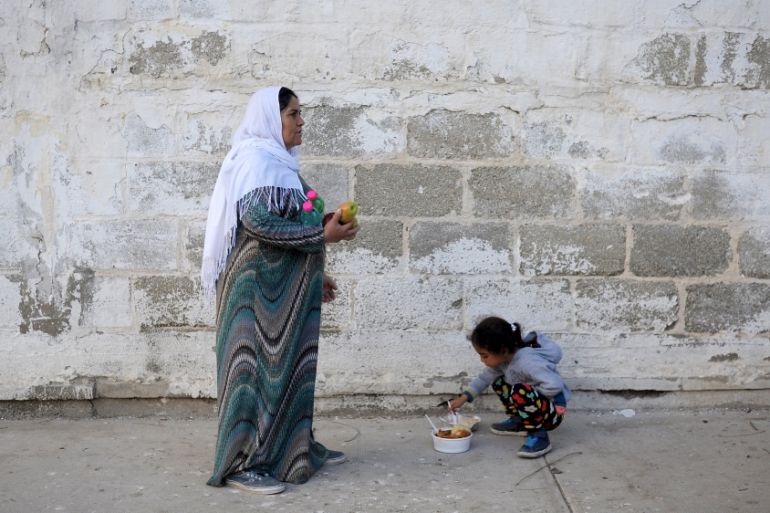Volunteers leave Greek island after attacks on refugees
Tensions continue to rise in Greek islands, where an estimated 8,400 refugees and migrants are left waiting.

Tensions have escalated in the Greek island of Leros following a series of attacks on refugees and migrants, while several international volunteers working in refugee camps have been evacuated from the island.
|
|
After locals attacked refugees on Saturday and threatened aid workers in the island’s main refugee camp, many international volunteers and groups halted their operations and left Leros on Sunday.
Keep reading
list of 4 itemsAs Israel attacked Gaza’s north, 26 members of his family were wiped out
What is Trident, the US floating pier off Gaza? Will it work?
Does Israel’s Netanyahu have a plan for a ‘day after’ the war on Gaza?
“There have been tensions which targeted both refugees and members of the humanitarian community,” said Katerina Kitidi, a Greece-based communications officer for the United Nations refugee agency (UNHCR).
“It all started from long-standing issues related to the situation on the island, which clearly shows that we need specific measures for people who have requested asylum,” she told Al Jazeera.
Clashes first broke out in the camp on Thursday due to rising anger over the Greek government’s asylum application process, which has moved at a snail’s pace and left more than 8,400 refugees and migrants stuck waiting on Greek islands.
On Saturday, with the internal tensions in the camp sparking fear, a group of about 150 mostly Iraqi Yazidis decided to leave the camp and head to the island’s main port Lakki.
“They were with their babies and all their bags,” Catharina Kahane, a cofounder of the Echo100 Plus charity group, told Al Jazeera.
‘They told us to get off the island’
Once in the village, they were confronted and attacked by a group of Greek men, she recalled, adding that police only intervened to force the refugees to walk back to the camp. While driving back to the camp, she then received a phone call and was told to leave the island.
Once near the camp’s entrance, a group of about 50 locals with shovels and sticks blocked the road. “They stopped our car and started hitting it,” she said.
READ MORE: Refugees in Chios fear violence from right-wing locals
“They told us to get off the island. They said if we didn’t get the first boat off the island something terrible would happen. It was scary. The only reason we left the island was because the police weren’t moving at all to help.”
“It was clear that the police were on [the attackers’] side,” Kahane said, explaining that she and her team of nearly 15 volunteers have now relocated to another Greek island.
She added that only a handful of independent volunteers are still on Leros following the rise in tensions between the locals, on the one hand, and asylum seekers and volunteers, on the other.
Speaking to Al Jazeera on Sunday, Milena Zajovic Milka of the Are You Syrious? activist group said of Leros: “At the moment, the situation inside the camp seems to be calm. But [the refugees] are still very frightened, and many are injured.”
Stuck in Greece
The main camp in Leros is home to around 670 asylum seekers, most of whom have been stuck on the island since March when the European Union and Turkey struck a deal to halt the flow of refugees.
Refugees and migrants who arrived after the EU-Turkey deal are given the options of applying for asylum there or deportation back to Turkey.
Borders across the Balkans were sealed following the EU-Turkey deal, leaving more than 57,000 refugees and migrants bottlenecked in Greece.
With anger among refugees and locals on the Greek islands, attacks and clashes have also taken place in other islands, including Chios.
In late March, the UNHCR and the Doctors Without Borders medical charity pulled out of government-administered camps and ‘hotspots’ on several Greek islands. The UNHCR cited “unfair and inhumane” conditions.
READ MORE: In Greek refugee camps, ‘Children grow sicker every day
George Kiritsis, a government spokesman on migration, defended Greece’s decision to restrict asylum seekers who arrived after the EU-Turkey deal to the islands.
“They are free in the islands, but they cannot leave the islands until the applications are processed,” he told Al Jazeera. “This is practical because the asylum committees must be able to locate the people.”
Fleeing war and economic devastation, more than a million refugees and migrants took boats across the Mediterranean Sea and landed on European shores in 2015, according to the UNHCR.
The UNHCR has documented the arrival of more than 237,000 so far this year. At least 2,896 died or went missing along the way, according to the organisation’s statistics.
Follow Patrick Strickland on Twitter: @P_Strickland_
|
|